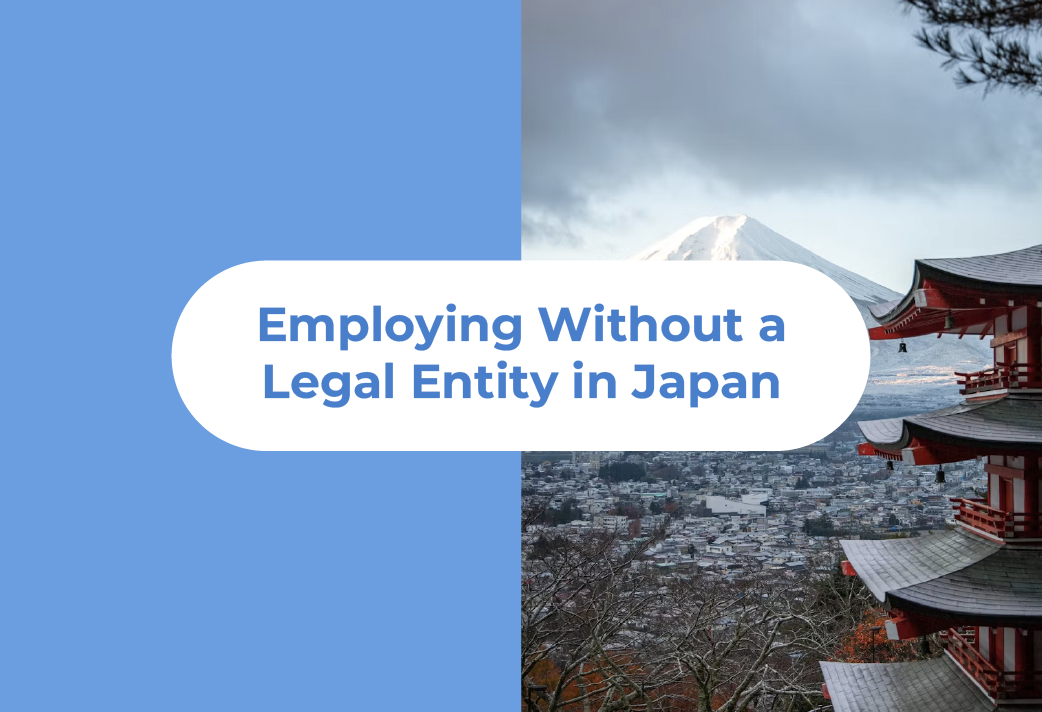A strategic position in Asia, coupled with a stable political and economic climate, make Japan an appealing market for international businesses. Japan’s focus on innovation and efficiency offers substantial opportunities for companies aiming to expand their global reach through new local staff. However, venturing into the market presents challenges, particularly when hiring in Japan without a legal entity already established.
Setting up a legal entity in Japan can be complex and lengthy thanks to upcoming business and employment law reforms in Japan. Thankfully, businesses can navigate these challenges by instead hiring staff through alternative solutions like Employer of Record (EOR) services.

Tired of scrolling? Download a PDF version for easier offline reading and sharing with coworkers
Can You Hire Employees Without a Legal Entity in Japan?
Absolutely. Hiring local or foreign employees in Japan without establishing a legal entity is possible through a number of different methods, though each has pros and cons that may make it more or less suitable for your needs.
Employer of Record (EOR) Services
An EOR assumes the legal responsibilities of employing staff in Japan, including managing employment contracts, payroll, tax filings, social security contributions, and ensuring compliance with local labor laws.
An EOR acts as the legal employer on behalf of your company, enabling compliance with Japanese labor laws without the need to set up a subsidiary or branch office. At the same time, you maintain control over the employees’ day-to-day responsibilities.
Professional Employer Organization (PEO)
Similar to an EOR, a PEO provides employment services but typically requires the client company to have a legal presence in the country. The PEO co-employs the workers, sharing employer responsibilities like liability and hiring with the client company.
Independent Contractors
Hiring independent contractors can be flexible and cost-effective, as contractors handle their own taxes and benefits. However, misclassification risks and compliance issues can arise if contractors are effectively functioning as employees.
Staffing Agencies
Staffing agencies can hire employees and lease them to your company. This can be a quick solution, though potentially more expensive and less integrated with your company culture and long-term goals.
How Can You Calculate the Cost of Using an EOR in Japan to Replace Traditional Company Incorporation
The cost of using an EOR in Japan varies depending on factors such as the number of employees, the complexity of employment arrangements, and the specific services required. EORs typically charge a percentage of the employee’s gross salary ranging from 10% to 20%. This fee generally covers:
- Payroll processing
- Tax compliance
- Employee benefits management
- Legal and HR support
- Onboarding and offboarding processes
Because of the range of services it takes over without the need to spend on more overheads, using an EOR can often be more cost-effective than the costs associated with establishing and maintaining a legal entity in Japan.
Can an EOR Help with Compliance and Legal Issues?
Yes, an EOR is essential for ensuring compliance with Japanese labor laws and regulations, which can be complex and stringent. Key compliance areas include:
- Employment Contracts – Japanese law requires clear and detailed written employment contracts. An EOR ensures these contracts comply with local laws.
- Social Insurance – Employers must contribute to social insurance schemes, including health insurance, pension, unemployment insurance, and workers’ compensation. An EOR manages these contributions.
- Tax Withholdings – EORs handle the intricate tax withholding and filing requirements for both the employer and the employee.
- Termination Procedures – Japanese labor laws offer significant protection to employees, especially regarding termination. An EOR ensures that terminations are legally compliant, reducing the risk of disputes.
Conclusion – Hire in Japan Efficiently and Compliantly with INS Global EOR Services
Hiring in Japan without a legal entity is not only feasible but also efficient and compliant when using an EOR like INS Global. Our EOR services provide a seamless solution for businesses looking to expand into the Japanese market without the administrative burden and costs of establishing a local entity.
With INS Global, you can quickly and compliantly hire the talent you need to drive your business forward in Japan and 160+ other countries worldwide.
Contact our expansion experts today to learn more.
FAQ
Are there risks associated with employing without a legal entity in Japan?
While employing without a legal entity can be straightforward with the right EOR partner, potential risks include non-compliance with local laws, cultural misunderstandings, and employee integration challenges. Choosing a reputable EOR like INS Global mitigates these risks significantly.
Can I hire contractors in Japan instead of full-time employees?
Yes, hiring contractors is an option, but ensuring that contractors are genuinely independent and not misclassified employees is crucial. Misclassification can lead to legal and financial penalties.
What should I consider when hiring freelancers in Japan?
When hiring freelancers, ensure that the arrangement meets the legal criteria for independent contracting. Factors to consider include the freelancer’s control over their work schedule, the provision of their own equipment, and the ability to take on other clients. Clear contracts outlining the scope of work, payment terms, and intellectual property rights are essential.
How do I handle payroll and taxes in Japan without a legal entity?
An EOR will manage payroll and taxes for you. They handle salary payments, tax withholdings, and social security contributions, ensuring compliance with all local tax regulations.
How do I pay an international employee in Japan?
An EOR facilitates payments to international employees, ensuring that salaries are paid in accordance with Japanese labor laws and tax regulations. This includes managing currency conversions if necessary.
Is it possible to transition from an EOR in Japan to a legal entity later on?
Yes, transitioning from an EOR to a legal entity is possible. An EOR can assist with the transition process, ensuring a smooth transfer of employees and compliance with all legal requirements and tax laws.
What happens if there are disputes with employees hired through an EOR in Japan?
Disputes are typically handled by the EOR, which acts as the legal employer. The EOR will follow Japanese labor laws and dispute resolution processes, providing support to resolve any issues.
Can I switch EOR providers in Japan if I’m not satisfied with the service?
Yes, you can switch EOR providers if needed, but it is essential to ensure a seamless transition to avoid disruptions to your employees. Carefully review contracts and terms with the current and prospective EOR providers.
Can U.S. companies hire foreign workers in Japan?
Yes, U.S. companies can hire foreign workers in Japan. Using an EOR simplifies the process, ensuring compliance with Japanese labor laws and visa requirements.
Do foreign workers need visas or work permits in Japan?
Yes, foreign workers typically need visas or work permits to work in Japan. An EOR can help navigate the visa application process and ensure compliance with immigration and employment laws.


SHARE